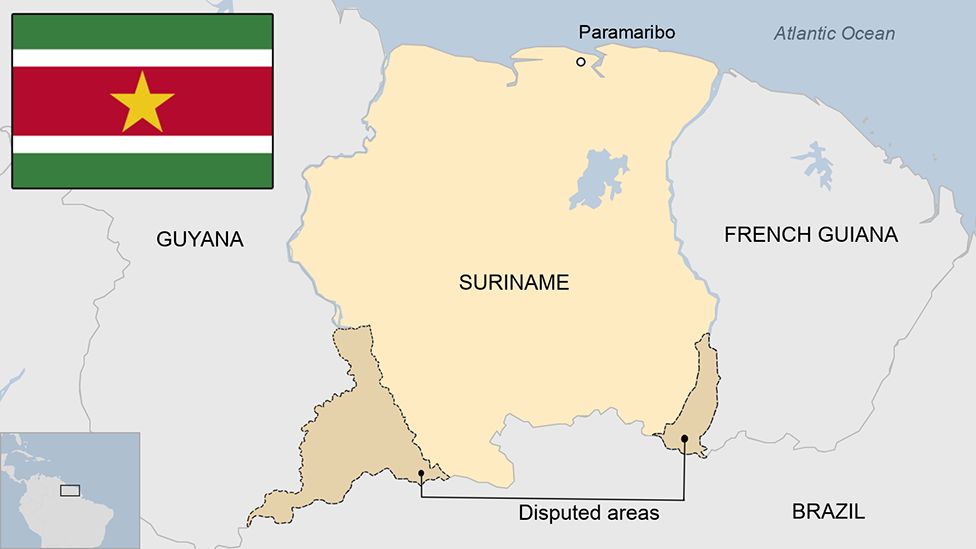Suriname country profile
- Published

Suriname, once known as Dutch Guiana, is one of South America's smallest countries. It enjoys a relatively high standard of living but also faces serious political and economic challenges.
Since independence from the Netherlands in 1975, Suriname has endured coups and a civil war. Suriname is one of the most ethnically diverse countries in the Americas.
Most of its people are descended from African slaves and Indian and Javanese indentured labourers brought over by the Dutch to work in agriculture. Most political parties are ethnically based.
Gold, oil and agriculture are key economic sectors. Bauxite mining has gone into decline. Efforts have been made to diversify the economy.
- Read more country profiles - Profiles by BBC Monitoring
REPUBLIC OF SURINAME: FACTS
- Capital: Paramaribo
- Area: 163,821 sq km
- Population: 632,638
- Languages: Dutch, Sranan Tongo, plus regional languages
- Life expectancy: 69 years (men) 75 years (women)
LEADERS
President: Chan Santokhi
Parliament elected former police chief Chandrikapersad "Chan" Santokhi to the presidency in July 2020. He stood unopposed.
He took over from controversial arch-rival Dési Bouterse, who had served as elected president since 2010 and military ruler in 1980-1987. Mr Santokhi's centre-left Progressive Reform Party won the parliamentary elections in May 2020.
It was his investigation that had secured a murder conviction against President Bouterse the previous year.
MEDIA
Reporters Without Borders praises Suriname's varied media landscape. State-run broadcasters operate alongside private radio and TV stations.
The country enjoys a pluralist media landscape. The two major private papers are De Ware Tijd and De West.
TIMELINE
Some key dates in Suriname's history:
1593 - Spanish explorers visit the area and name it Suriname, after the country's earliest inhabitants, the Surinen.
1600-1650 - Settlements attempted by Spanish, Dutch, British and French during the first half of the 17th Century. They all fail, in part because of resistance by the native inhabitants.
1651 - First permanent European settlement in Suriname, established by the British at Paramaribo.
1667 - British cede their part of Suriname to the Netherlands in exchange for New Amsterdam (later called New York City).
1682 - Coffee and sugar cane plantations established and worked by African slaves.
1799-1802, 1804-16 - British rule is reimposed. The colony is returned to Dutch rule at the end of the Napoleonic wars.
1863 - Slavery abolished; indentured labourers brought in from India, Java and China to work on plantations.
1916 - Aluminium Company of America (Alcoa) begins mining bauxite - the principal ore of aluminium - which gradually becomes Suriname's main export.
1954 - Suriname given full autonomy, with the Netherlands retaining control over its defence and foreign affairs.
1975 - Independence. More than a third of the population emigrates to the Netherlands.
1980 - First of several coups.
1982- Armed forces seize power in a coup led by Lieutenant-Colonel Desiré "Dési" Bouterse and set up a Revolutionary People's Front; 15 opposition leaders charged with plotting a coup and executed; Netherlands and US respond by cutting off economic aid.
1986 - Surinamese Liberation Army (SLA), composed mostly of descendants of escaped African slaves, begins guerrilla war with the aim of restoring constitutional order. Within months principal bauxite mines and refineries forced to shut down.
1992 - Peace accord reached with SLA.
2004 - Suriname dollar replaces guilder. Government says move aims to restore confidence in economy. UN sets up tribunal to try to resolve long-running maritime border dispute between Suriname and neighbouring Guyana.
2007 - UN tribunal rules in the Guyana-Suriname dispute over maritime territory, giving both a share of a potentially oil-rich offshore basin.
2020 - Suriname's President Santokhi and Guyana's President Ali confirm the two countries' aim of moving ahead with economic cooperation and development while a commission looks at the New River Triangle area between the two countries - a border dispute dating back to the 19th Century.
Related Topics
- Published4 December 2023
- Published24 April 2023
- Published11 December 2023
- Published2 June 2023
- Published2 June 2023